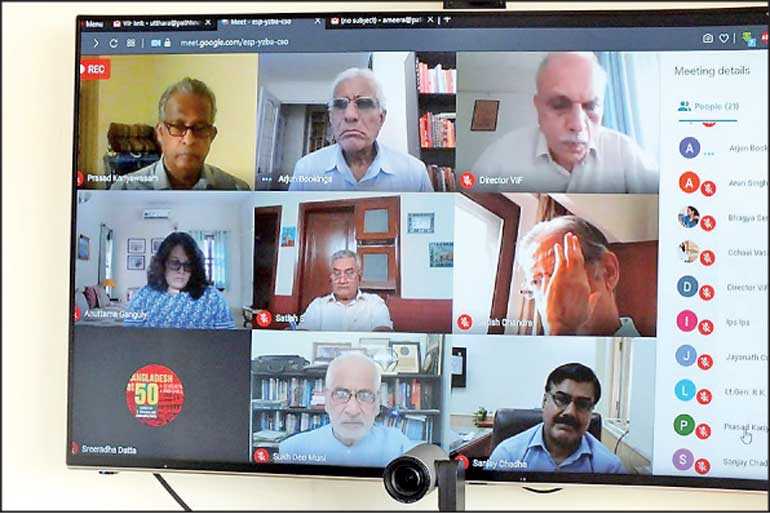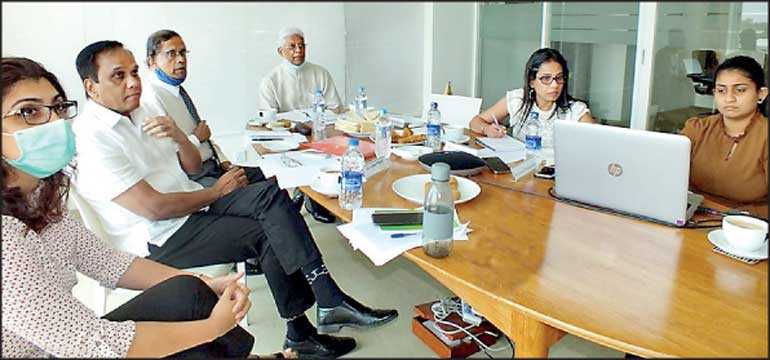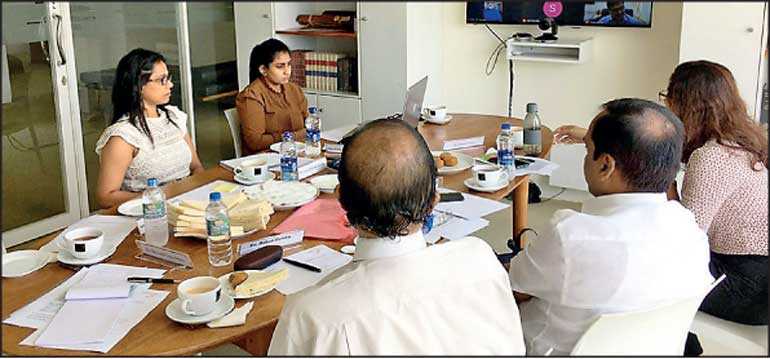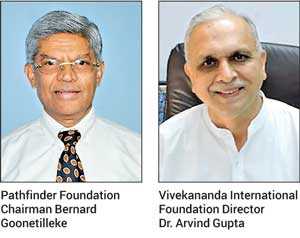Wednesday Feb 25, 2026
Wednesday Feb 25, 2026
Saturday, 22 August 2020 00:00 - - {{hitsCtrl.values.hits}}

Virtually at the meeting from several parts of the world

Pathfinder Foundation representative at communication room
 The Pathfinder Foundation (PF) and Vivekananda International Foundation (VIF), a leading think tank in India, conducted a webinar with virtual participation of several experts from both countries on the themes ‘Regional and Geopolitical Environment’ and ‘Indo-Lanka Trade & Economic Relations’.
The Pathfinder Foundation (PF) and Vivekananda International Foundation (VIF), a leading think tank in India, conducted a webinar with virtual participation of several experts from both countries on the themes ‘Regional and Geopolitical Environment’ and ‘Indo-Lanka Trade & Economic Relations’.
The two delegations were headed by Bernard Goonetilleke, Chairman, Pathfinder Foundation and Dr. Arvind Gupta, Director-Vivekananda International Foundation. Dr. Indrajit Coomaraswamy, Former Governor of the Central Bank of Sri Lanka and Mr. Sanjay Chadha, Additional Secretary, Ministry of Commerce and Industry of India addressed the subject of Indo-Lanka trade and economic relations, whilst Admiral (Prof.) Jayanath Colombage, Secretary-Ministry of Foreign Affairs and Mr. Anil Wadhwa, former Secretary (East) in the Ministry of External Affairs of India provided their personal perspectives on regional
geopolitics.
During the session on trade and economic relations, given the dynamics of geopolitics in the Indian Ocean Region, the need for a rules-based framework following the principle of non-reciprocity in the interest of a smaller economies within an asymmetric system was brought forth. Increasing people-to-people contacts taking advantage of the island’s close proximity to South India and the number of favourable factors existing to build a good foundation for trade between the two countries was stressed on.
The Indo Lanka Free Trade Agreement of 2000 was also discussed with its unrealized potential as well as impediments. Export, investment, training and technology transfer, creation of special economic zones, improvement in connectivity and logistics and electrical grid connectivity were pointed out as areas to focus on for enhancing economic relations between the two nations. It was noted that Indian investment in the island has increased considerably during the past few years, whilst Sri Lankan businesses too have begun operations in India.
The Economic and Technology Co-operation Agreement (ETCA) that seeks to add to the existing free trade agreement between the two nations was noted as a positive venture for both parties after necessary refinement. The discussion that followed brought out concerns related to public mistrust of the free trade agreements in general and how to overcome this issue by increasing transparency. The fisheries issue in the Palk Strait area that adversely affect bilateral relations and economic interests of the island was considered as an issue that need to be resolved through determined action and negotiation.
The session on the regional geopolitical environment focused on how the Covid-19 pandemic has created a new world order where Sri Lanka, although a smaller nation, has been successful is meeting challenges. In an environment where the role of international organizations such as the WHO are questioned, two new specific areas have emerged – food security and medical security. In this respect, attention was drawn to the fact that India gifted large quantities of medical supplies, which has led to a novel phenomenon of ‘health diplomacy’.
The Sri Lankan public’s tendency to mistrust its larger neighbour was considered as the principal obstacle to improving relations between the neighbouring countries. The mistrust coupled with prevailing ignorance of each other has prevented better understanding between the populations of the two countries. The meeting also focused its attention on the importance of the Indian Ocean for global economic wellbeing and discussed aspects relating to militarisation of the Indian Ocean.
Indian Prime Minister Narendra Modi’s vision towards Security and Growth of all in the Region (SAGAR) was pointed out as a positive development within the region with least economic integration. Sri Lanka’s new policy of interacting more within the region, including primarily engaging with India on security related issues was considered a positive development, while similar economic links should be established in order to move forward productively. Increase of Indian foreign direct investment (FDI) as a contributing factor to reduce the trust deficiency was also highlighted.
A suggestion for the two Foundations to follow up on this discussion on how to reset the relationship between the two countries in the post-COVID 19 era emerged as a recommendation for follow-up activity.
Amongst those present virtually at the meeting were, Prasad Kariyawasm, Sri Lanka’s former Ambassador to the United States and India while Dr. Rohan Perera, former Permanent Representative of Sri Lanka to the United Nations; and Dr. Valson Vethody, former Ambassador joined the webinar with the Pathfinder team at their office. In addition, representatives of the business community, think tanks, and academic institutions took part in the webinar. Prof. S. D. Muni; Satish Chandra, former ambassador; Lt. Gen. R. K. Sawhney and several others represented the VIF.